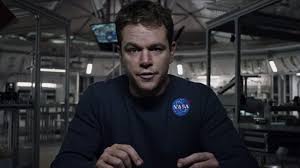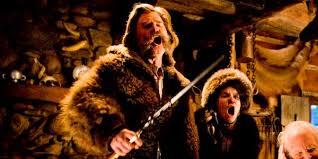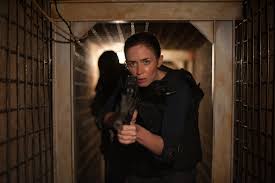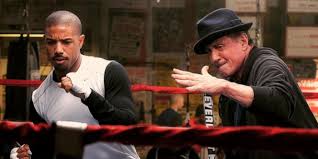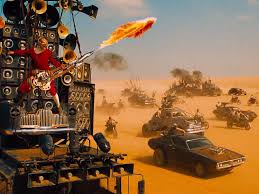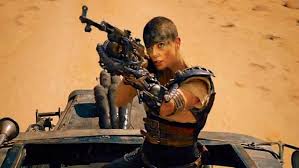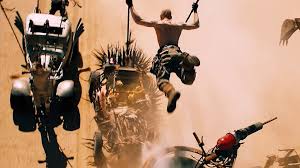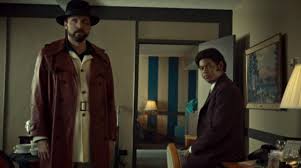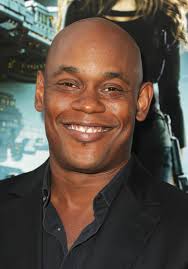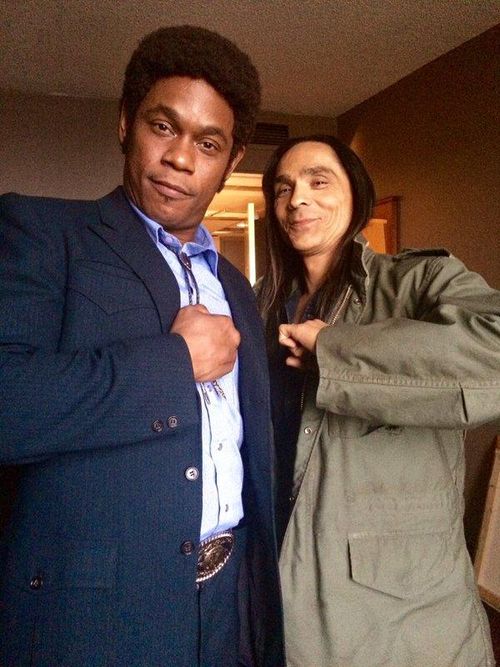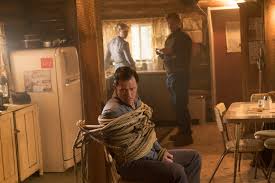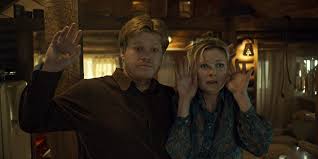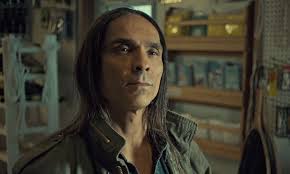This year I decided to do something a little different. Since the
rankings are largely arbitrary anyway, particularly after the top couple
slots, I decided that instead of doing full rankings and write ups of
the 6-10 spots, I’d award a singular superlative to each of them. All
have my wholehearted recommendation, but I am just going to highlight
the aspect that stands out most in each.
The Martian is a wonderful, funny, optimistic time at the movies – the exact photo-negative in all respects to Ridley Scott’s prior outing, the pitch-black, interminable The Counselor, which just cements him as our most impossible-to-figure-out great filmmaker. Drew Goddard’s script deserves some love, but it’s the Damon show from start to finish. The heart of the story is him talking to himself and/or an unresponsive, sometimes hypothetical audience, and if he wasn’t so relentlessly likable the whole production would fall down around his ears. But he is, and it doesn’t, and it’s makes the most extreme, harrowing survival tale conceivable into a pure pleasure from start to finish.
I saw the 70mm roadshow production of this movie yesterday, and I’ll probably regret not putting this in the top 5 at some point, as Tarantino joints are frequently growers. But there’s a lot to process right now, so all I can say right off the bat is that his epic mash up of Django’s operatic western splatter and Reservoir Dogs’ claustrophobic paranoia is 1) absolutely gorgeous and cunningly staged in its intended format, and 2) acted to the absolute nines by all nine primary actors. It’s hard to pick an MVP between Jennifer Jason Leigh, Walton Goggins and Samuel L. Jackson, but that shouldn’t be taken to mean that Kurt Russell or James Park are slouching. It’s a shame that Goggins in particular took so long to make his way into QT’s stable, but he smacks on the man’s overly-written dialogue like particularly sticky piece of taffy.
The Hateful 8 certainly lives up to its name, and contains ugliness that even some who think themselves inured to Tarantino’s brand of provocation will find difficult to stomach. But the man is one of our most brilliant provocateurs, and every one of his works is a major one.
Except Death Proof. That one’s just eh.
A blend of the Coen’s apocalyptic border bloodbath No Country For Old Men and the paramilitary proficiency porn of Michael Mann, Sicario contains the pulse-pounding suspense and authenticity of the latter with the disregard for conventional story structure and unblinking despair of the former. It will probably be remembered for a couple of standout sequences (the border crossing “ambush” and final raid), but hopefully also for demonstrating that Dame Emily Blunt (it’s only a matter of time, so I’m just going to start calling her that now) is one of the best and most fearless actresses in the world.
I can’t believe I have two consecutive picks on this list that are foreign indie vampire movies. And this one – black and white, subtitled and practically plotless, equally enamored of French New Wave cinema and 80’s New Wave music – sounds like it should be completely insufferable film school drivel. But this Iranian gem casts its thrall through gorgeous cinematography and especially its pulsing, infectious soundtrack. Once Ana Lily Amirpour’s exercise in style started up, I only looked up once, for long enough to order the soundtrack from iTunes.
Now the Top 5:
They don’t make movies like Bone Tomahawk anymore. They probably never did, really. They used to make movies like the first 95 minutes or so, straightforward westerns that rely on impeccable casts and sharp but not-fussed-over dialogue for their kick. But they never put 30 minutes of hardcore cannibal horror film on the end of one, and they certainly never filmed those cannibal flicks in the same measured, unsentimental way as the classical western. The lack of gonzo glee in the (stomach-churning) effects and violence make them hit all the harder. This is a movie where violence just happens, rising out of the landscape without dramatic music stings or frantic cutting, or even extended pregnant silences to set them up. And the sickening suddenness of it has an unsettling effect, which grounds the exaggerated Troglodyte menace in something that feels realer than most films that don’t include battles with subhumanoid cannibals.
And those cannibals are striking, but it’s the performances that steal the show. Kurt Russell continues a great year in the West, and Patrick Wilson is his reliable self, though nothing he does here touches his stellar work in Fargo. David Arquette is bumming around for a while at the beginning, if that’s your thing (it is not your thing). The standouts are Richard Jenkins and Mathew Fox, however. Jenkins maintains his innate sweetness as simple deputy, but seeing him play both fairly dumb and fairly capable inverts his standard persona to the point of rendering him unrecognizable. And Fox sinks his teeth into a role that plays to his natural standoffishness and spins it into something compelling and ambivalent.
I don’t see this movie becoming a classic, even of the cult variety, because the two genres it grafts together have such a narrow overlap in their Venn Diagram of fans. But if that overlap falls anywhere, it’s on a site like this one, so give it a shot. It’s a movie that should not exist, which I mean in the most complimentary way possible.
Watch It For: Marveling at how well it marries the content of a splatterfest with the sensibility of a reserved western. Also Jenkins’ lovely Chicory.
This horror flick has a hook so strong and obvious that your first reaction is to wonder why it hasn’t been done a dozen times before: a sexually transmitted curse. Though when you think about it, that’s just making the subtext of a hundred slasher movies literal, so it arguably does have its own subgenre already. There are some discussions to be had about the “meaning” of the curse – is it meant to evoke STDs, unwanted pregnancies, general social stigmas – but ultimately it strikes me as less preoccupied with sex, and less sexy, than many of its less thoughtful genre predecessors. A lot of those had more to say about sex on accident than It Follows does on purpose, in my opinion.
It’s not tying the monster explicitly to sex that makes It Follows work so well, it’s the visceral quality of how that monster is executed and the atmosphere in which it lurks. The movie has taken flack from some for the “rules” of said monster being inconsistent, but that only feeds into the film’s tone of encroaching doom. If you read film criticism, particularly the bad sort, you will see the term “dream logic” pop up sooner or later. But I can’t think of another film that captures the peculiar, cruel logic of a nightmare for such an extended period (even David Lynch, the all-time master of uncanny dread, prefers to employ jarring contrasts that break up the spell from scene to scene). Once you are targeted, It comes for you. It never moves faster than a slow walk, but it never, ever stops. It can look any way it wants, but its deliberate gait identifies it, and physical attacks have only the most perfunctory effect on slowing its progress. The relentless pursuit, the unhurried nature, the physical invulnerability, the way it can look like one person while simultaneously being another thing entirely, these are all elements drawn directly out of my own recurring dreams and nightmares. And Mitchell’s floating camera work and indistinct time period only accentuate that feeling of unmoored peril.
Which is to say, even when the creature acts “out of character” and doesn’t makes sense, it provides no break or relief from the creeping horror.
See It For: The way even the most basic establishing shots or moments of bald exposition become the most harrowing game of Where’s Waldo you’ve ever played.
Alex Garland is one of the most criminally underrated creative minds in the world. His scriptwork is intellectual but accessible, bringing a hard sci-fi edge to genres as varied as horror (28 Days Later), men-on-a-mission (Sunshine), British Tragedy-Of-Manners (Never Let Me Go), shoot em up (Dredd) and now, with Ex Machina, a locked-room thriller. All of those movies are remarkable in their own ways (Sunshine in particular is one of the best and most overlooked sci-fi movies of the century), and Ex Machina sees him stepping behind the camera for the first time to continue the streak in stylish but understated fashion. Tightly scripted and immaculately acted by Alicia Vikander, Oscar Isaac, and Domhall Gleeson, the movie is an unassuming marvel on a narrative and technical level; the digital work to make Vikander both disarmingly sensual and jarringly uncanny is of the type that is too off-handedly believable to garner the attention it deserves.
But it’s the story that is the star, a sleek, sexy bit of business that would do Rod Serling proud with its (just barely sub-)text. It starts out as an explicit interrogation of artificial intelligence and Turing tests, then morphs into a fascinating dissection of gender dynamics, then twists back to the sci-fi before it can calcify into a simple “Men Be Like…, Women Be Like…” treatise. The result is something much more complicated and nuanced than interpreting it as a straightforward gender allegory gives credit. It’s a story about projection, about the dangers and folly of insisting on viewing that which is disconcertingly different solely in terms that we are most comfortable with. If we owe machines better than that, we owe an entire gender even more, and it’s at our own peril that we deny their sentience and complexity.
See It For: Alicia Vikander gives the knockout performance, but she don’t dance like Isaac. What. The. Fuck.
I have only the Constitutionally-mandated love the Rocky series (meaning the first is a classic, and think the sequels start unnecessary and gradually became embarrassing enough that I wasn’t even interested in watching the “franchise redeeming” VIth installment), and I quite simply do not trust Sylvester Stallone. Not even in that I think he’s exploiting his most popular character/persona for crass reasons, just in the way I don’t want to bring a mixed-race girlfriend around my drunk uncle. It’s not that his intentions are bad, just that he’s unable to transcend the time/place in which he lives, and almost congenitally uncool. So you never know what you’re going to get with a Stallone joint. It could be a stone cold, era-defining classic; it could be a garish, embarrassingly misguided failure. Or it could be Demolition Man, which is somehow both.
On top of which, I really wish that the 80’s could have died with dignity (a strange thing to expect, given how it lived). We all could have left Rocky Balboa, John McClane, John Rambo, Indiana Jones and the T-800 all in 20th century and probably been all the better for it. At least that was my attitude coming into 2015, but having seen Rocky, Mad Max and Star Wars all manage to return from significant hiatuses and not only do justice to their old white icons, but to effectively pass the torch to a new, more inclusive generation, it’s a lot harder to hold to such blanket dismissals.
It helps that Stallone relegates himself entirely to a supporting player here, finally ceding that Rocky is too old to put on the trunks himself. He also passes the torch behind the scenes, and writer/director Ryan Coogler brings the hunger of a young fighter to the film, while plugging it into the heretofore neglected black communities of Philadelphia and boxing. Michael B. Jordan gives a searing star turn as Apollo Creed’s illegitimate son, but those of us who knew him when he was Wallace expect nothing less at this point. Stallone himself brings the beating heart, and Coogler’s camera captures the fight action in a way that is both more immediate and authentic than the series’ effective but cartoon-y aesthetics have ever been. If you had any misgivings about this concept or trailers, then believe me I feel you on that. But this is exactly the movie we were afraid to hope it was.
Watch It For: The stunningly visceral, intimate boxing scenes, particularly the breathless one-shot middle bout.
I don’t need to tell you about this movie at this point. The internet loves it. This site in particular loooves it. Critics love it. Cosplayers love it in their special, vaguely unsettling fashion. One would assume Australian cosplaying bassist bungie enthusiasts really, really, really love it, but it turns out they don’t like to feel pandered to (sensitive bunch, really). I actually didn’t want to place it here because I feel like the spot is better used to draw attention to something that might otherwise pass under someone’s radar. And because I think the movie is not quite the flawless masterpiece some have hailed it as – there are a couple parts where the action goes on too long without a break in intensity, which can create some sensory overload.
But literally perfect movies don’t exist, and Fury Road is both the best film of the year and awfully close to a platonic ideal for balls out, R-rated action. The world-building is unparalleled and striking, while also being confident enough not to ever fuss over itself. It hits the ground running, introducing and developing a full ensemble of characters on the fly. It has vehicular action that will stack up against absolutely anything the medium has ever produced, and also one of the year’s best fistfights. It also has a couple of the year’s most flat-out beautiful shots (the entrance into the sandstorm and Theron’s desert scream). It has a nearly perfect blend of practical and computer effects. And it has Imperator Furiosa.
I’ll leave thinkpieces about Furiosa’s larger significance to feminist whatevers to others. Instead I’ll just say this: Furiosa kicks ass in this movie. Tom Hardy is one of our best actors working today, and Charlize Theron absolutely hijacks the movie from him, jury-rigs her own steering wheel from a human skull, and drives it straight into a sea of exploding tornadoes. It’s only Max’s relationship to Furiosa that makes him at all relevant to the movie, or even sympathetic. She’s the one with the plan, the boldness to launch it into action, the skills to pull it off, and an emotional stake in the outcome. He is just along for the ride.
And what a ride it is. Much has been made in the last week or two about the other iconic 70’s/80’s sci-fi action franchise revival, and the feminist credentials (or lack thereof) of its’s ass-kicking heroine. And while I’m not qualified or really all that interested in saying whether Rey is a more empowering depiction than Furiosa, I can say for sure that she is a hell of a lot more boring. Because The Force Awakens is so worried about making her awesome, that it forgets to actually challenge her in any real way. Fury Road absolutely puts Furiosa through the ringer, forces her to face real loss and despair and compromise, to rely on others to beat the incredibly long odds she’s taken on, while still being their leader. And her triumphs, while not nearly as all-encompassing, are vastly more satisfying because she bled with us to get there.
Watch It For: Charlize Theron being elbowing her way into instant-icon status.
BEST PERFORMANCE (SOLO BOLO) – MATT DAMON, THE MARTIAN
The Martian is a wonderful, funny, optimistic time at the movies – the exact photo-negative in all respects to Ridley Scott’s prior outing, the pitch-black, interminable The Counselor, which just cements him as our most impossible-to-figure-out great filmmaker. Drew Goddard’s script deserves some love, but it’s the Damon show from start to finish. The heart of the story is him talking to himself and/or an unresponsive, sometimes hypothetical audience, and if he wasn’t so relentlessly likable the whole production would fall down around his ears. But he is, and it doesn’t, and it’s makes the most extreme, harrowing survival tale conceivable into a pure pleasure from start to finish.
BEST PERFORMANCE (ENSEMBLE) – THE HATEFUL EIGHT
I saw the 70mm roadshow production of this movie yesterday, and I’ll probably regret not putting this in the top 5 at some point, as Tarantino joints are frequently growers. But there’s a lot to process right now, so all I can say right off the bat is that his epic mash up of Django’s operatic western splatter and Reservoir Dogs’ claustrophobic paranoia is 1) absolutely gorgeous and cunningly staged in its intended format, and 2) acted to the absolute nines by all nine primary actors. It’s hard to pick an MVP between Jennifer Jason Leigh, Walton Goggins and Samuel L. Jackson, but that shouldn’t be taken to mean that Kurt Russell or James Park are slouching. It’s a shame that Goggins in particular took so long to make his way into QT’s stable, but he smacks on the man’s overly-written dialogue like particularly sticky piece of taffy.
The Hateful 8 certainly lives up to its name, and contains ugliness that even some who think themselves inured to Tarantino’s brand of provocation will find difficult to stomach. But the man is one of our most brilliant provocateurs, and every one of his works is a major one.
Except Death Proof. That one’s just eh.
BEST CINEMATIC GENE SPLICE – SICARIO
A blend of the Coen’s apocalyptic border bloodbath No Country For Old Men and the paramilitary proficiency porn of Michael Mann, Sicario contains the pulse-pounding suspense and authenticity of the latter with the disregard for conventional story structure and unblinking despair of the former. It will probably be remembered for a couple of standout sequences (the border crossing “ambush” and final raid), but hopefully also for demonstrating that Dame Emily Blunt (it’s only a matter of time, so I’m just going to start calling her that now) is one of the best and most fearless actresses in the world.
BEST SOUNDTRACK – A GIRL WALKS HOME ALONE AT NIGHT
I can’t believe I have two consecutive picks on this list that are foreign indie vampire movies. And this one – black and white, subtitled and practically plotless, equally enamored of French New Wave cinema and 80’s New Wave music – sounds like it should be completely insufferable film school drivel. But this Iranian gem casts its thrall through gorgeous cinematography and especially its pulsing, infectious soundtrack. Once Ana Lily Amirpour’s exercise in style started up, I only looked up once, for long enough to order the soundtrack from iTunes.
BEST JOKE – WHAT WE DO IN THE SHADOWS
Just look at this. Jermaine Clement has the strongest deadpan in at least one hemisphere (it’s only Andre Braugher that keeps the Northern in contention), and this is the closest they could get to straight take for this line, coming from his very self-serious character.Now the Top 5:
5. BONE TOMAHAWK (S. CRAIG ZAHLER)
They don’t make movies like Bone Tomahawk anymore. They probably never did, really. They used to make movies like the first 95 minutes or so, straightforward westerns that rely on impeccable casts and sharp but not-fussed-over dialogue for their kick. But they never put 30 minutes of hardcore cannibal horror film on the end of one, and they certainly never filmed those cannibal flicks in the same measured, unsentimental way as the classical western. The lack of gonzo glee in the (stomach-churning) effects and violence make them hit all the harder. This is a movie where violence just happens, rising out of the landscape without dramatic music stings or frantic cutting, or even extended pregnant silences to set them up. And the sickening suddenness of it has an unsettling effect, which grounds the exaggerated Troglodyte menace in something that feels realer than most films that don’t include battles with subhumanoid cannibals.
And those cannibals are striking, but it’s the performances that steal the show. Kurt Russell continues a great year in the West, and Patrick Wilson is his reliable self, though nothing he does here touches his stellar work in Fargo. David Arquette is bumming around for a while at the beginning, if that’s your thing (it is not your thing). The standouts are Richard Jenkins and Mathew Fox, however. Jenkins maintains his innate sweetness as simple deputy, but seeing him play both fairly dumb and fairly capable inverts his standard persona to the point of rendering him unrecognizable. And Fox sinks his teeth into a role that plays to his natural standoffishness and spins it into something compelling and ambivalent.
I don’t see this movie becoming a classic, even of the cult variety, because the two genres it grafts together have such a narrow overlap in their Venn Diagram of fans. But if that overlap falls anywhere, it’s on a site like this one, so give it a shot. It’s a movie that should not exist, which I mean in the most complimentary way possible.
Watch It For: Marveling at how well it marries the content of a splatterfest with the sensibility of a reserved western. Also Jenkins’ lovely Chicory.
4. IT FOLLOWS (DAVID ROBERT MITCHELL)
This horror flick has a hook so strong and obvious that your first reaction is to wonder why it hasn’t been done a dozen times before: a sexually transmitted curse. Though when you think about it, that’s just making the subtext of a hundred slasher movies literal, so it arguably does have its own subgenre already. There are some discussions to be had about the “meaning” of the curse – is it meant to evoke STDs, unwanted pregnancies, general social stigmas – but ultimately it strikes me as less preoccupied with sex, and less sexy, than many of its less thoughtful genre predecessors. A lot of those had more to say about sex on accident than It Follows does on purpose, in my opinion.
It’s not tying the monster explicitly to sex that makes It Follows work so well, it’s the visceral quality of how that monster is executed and the atmosphere in which it lurks. The movie has taken flack from some for the “rules” of said monster being inconsistent, but that only feeds into the film’s tone of encroaching doom. If you read film criticism, particularly the bad sort, you will see the term “dream logic” pop up sooner or later. But I can’t think of another film that captures the peculiar, cruel logic of a nightmare for such an extended period (even David Lynch, the all-time master of uncanny dread, prefers to employ jarring contrasts that break up the spell from scene to scene). Once you are targeted, It comes for you. It never moves faster than a slow walk, but it never, ever stops. It can look any way it wants, but its deliberate gait identifies it, and physical attacks have only the most perfunctory effect on slowing its progress. The relentless pursuit, the unhurried nature, the physical invulnerability, the way it can look like one person while simultaneously being another thing entirely, these are all elements drawn directly out of my own recurring dreams and nightmares. And Mitchell’s floating camera work and indistinct time period only accentuate that feeling of unmoored peril.
Which is to say, even when the creature acts “out of character” and doesn’t makes sense, it provides no break or relief from the creeping horror.
See It For: The way even the most basic establishing shots or moments of bald exposition become the most harrowing game of Where’s Waldo you’ve ever played.
3. EX MACHINA (ALEX GARLAND)
Alex Garland is one of the most criminally underrated creative minds in the world. His scriptwork is intellectual but accessible, bringing a hard sci-fi edge to genres as varied as horror (28 Days Later), men-on-a-mission (Sunshine), British Tragedy-Of-Manners (Never Let Me Go), shoot em up (Dredd) and now, with Ex Machina, a locked-room thriller. All of those movies are remarkable in their own ways (Sunshine in particular is one of the best and most overlooked sci-fi movies of the century), and Ex Machina sees him stepping behind the camera for the first time to continue the streak in stylish but understated fashion. Tightly scripted and immaculately acted by Alicia Vikander, Oscar Isaac, and Domhall Gleeson, the movie is an unassuming marvel on a narrative and technical level; the digital work to make Vikander both disarmingly sensual and jarringly uncanny is of the type that is too off-handedly believable to garner the attention it deserves.
But it’s the story that is the star, a sleek, sexy bit of business that would do Rod Serling proud with its (just barely sub-)text. It starts out as an explicit interrogation of artificial intelligence and Turing tests, then morphs into a fascinating dissection of gender dynamics, then twists back to the sci-fi before it can calcify into a simple “Men Be Like…, Women Be Like…” treatise. The result is something much more complicated and nuanced than interpreting it as a straightforward gender allegory gives credit. It’s a story about projection, about the dangers and folly of insisting on viewing that which is disconcertingly different solely in terms that we are most comfortable with. If we owe machines better than that, we owe an entire gender even more, and it’s at our own peril that we deny their sentience and complexity.
See It For: Alicia Vikander gives the knockout performance, but she don’t dance like Isaac. What. The. Fuck.
2. CREED (RYAN COOGLER)
I have only the Constitutionally-mandated love the Rocky series (meaning the first is a classic, and think the sequels start unnecessary and gradually became embarrassing enough that I wasn’t even interested in watching the “franchise redeeming” VIth installment), and I quite simply do not trust Sylvester Stallone. Not even in that I think he’s exploiting his most popular character/persona for crass reasons, just in the way I don’t want to bring a mixed-race girlfriend around my drunk uncle. It’s not that his intentions are bad, just that he’s unable to transcend the time/place in which he lives, and almost congenitally uncool. So you never know what you’re going to get with a Stallone joint. It could be a stone cold, era-defining classic; it could be a garish, embarrassingly misguided failure. Or it could be Demolition Man, which is somehow both.
On top of which, I really wish that the 80’s could have died with dignity (a strange thing to expect, given how it lived). We all could have left Rocky Balboa, John McClane, John Rambo, Indiana Jones and the T-800 all in 20th century and probably been all the better for it. At least that was my attitude coming into 2015, but having seen Rocky, Mad Max and Star Wars all manage to return from significant hiatuses and not only do justice to their old white icons, but to effectively pass the torch to a new, more inclusive generation, it’s a lot harder to hold to such blanket dismissals.
It helps that Stallone relegates himself entirely to a supporting player here, finally ceding that Rocky is too old to put on the trunks himself. He also passes the torch behind the scenes, and writer/director Ryan Coogler brings the hunger of a young fighter to the film, while plugging it into the heretofore neglected black communities of Philadelphia and boxing. Michael B. Jordan gives a searing star turn as Apollo Creed’s illegitimate son, but those of us who knew him when he was Wallace expect nothing less at this point. Stallone himself brings the beating heart, and Coogler’s camera captures the fight action in a way that is both more immediate and authentic than the series’ effective but cartoon-y aesthetics have ever been. If you had any misgivings about this concept or trailers, then believe me I feel you on that. But this is exactly the movie we were afraid to hope it was.
Watch It For: The stunningly visceral, intimate boxing scenes, particularly the breathless one-shot middle bout.
1. MAD MAX: FURY ROAD (GEORGE MILLER)
I don’t need to tell you about this movie at this point. The internet loves it. This site in particular loooves it. Critics love it. Cosplayers love it in their special, vaguely unsettling fashion. One would assume Australian cosplaying bassist bungie enthusiasts really, really, really love it, but it turns out they don’t like to feel pandered to (sensitive bunch, really). I actually didn’t want to place it here because I feel like the spot is better used to draw attention to something that might otherwise pass under someone’s radar. And because I think the movie is not quite the flawless masterpiece some have hailed it as – there are a couple parts where the action goes on too long without a break in intensity, which can create some sensory overload.
But literally perfect movies don’t exist, and Fury Road is both the best film of the year and awfully close to a platonic ideal for balls out, R-rated action. The world-building is unparalleled and striking, while also being confident enough not to ever fuss over itself. It hits the ground running, introducing and developing a full ensemble of characters on the fly. It has vehicular action that will stack up against absolutely anything the medium has ever produced, and also one of the year’s best fistfights. It also has a couple of the year’s most flat-out beautiful shots (the entrance into the sandstorm and Theron’s desert scream). It has a nearly perfect blend of practical and computer effects. And it has Imperator Furiosa.
I’ll leave thinkpieces about Furiosa’s larger significance to feminist whatevers to others. Instead I’ll just say this: Furiosa kicks ass in this movie. Tom Hardy is one of our best actors working today, and Charlize Theron absolutely hijacks the movie from him, jury-rigs her own steering wheel from a human skull, and drives it straight into a sea of exploding tornadoes. It’s only Max’s relationship to Furiosa that makes him at all relevant to the movie, or even sympathetic. She’s the one with the plan, the boldness to launch it into action, the skills to pull it off, and an emotional stake in the outcome. He is just along for the ride.
And what a ride it is. Much has been made in the last week or two about the other iconic 70’s/80’s sci-fi action franchise revival, and the feminist credentials (or lack thereof) of its’s ass-kicking heroine. And while I’m not qualified or really all that interested in saying whether Rey is a more empowering depiction than Furiosa, I can say for sure that she is a hell of a lot more boring. Because The Force Awakens is so worried about making her awesome, that it forgets to actually challenge her in any real way. Fury Road absolutely puts Furiosa through the ringer, forces her to face real loss and despair and compromise, to rely on others to beat the incredibly long odds she’s taken on, while still being their leader. And her triumphs, while not nearly as all-encompassing, are vastly more satisfying because she bled with us to get there.
Watch It For: Charlize Theron being elbowing her way into instant-icon status.
